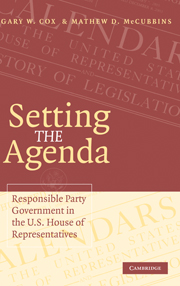Appendix
Published online by Cambridge University Press: 05 September 2012
Summary
In this appendix, we address the construct validity and external validity of our theory and measures. We also respond to an alternative theory recently developed by Krehbiel.
CONSTRUCT VALIDITY
Our ability to draw legitimate (believable) inferences from our results depends on our ability to demonstrate construct validity – that is, that our empirical measures reflect accurately the theoretical notions they are intended to capture (Trochim 2001: 64). This aspect of construct validity is often misunderstood, for it is widely believed that measures should reflect the world around us. However, valid measures must reflect one's theory, and one's theory, in turn, must be an analogy to the real world. Thus, construct validity raises questions about how to measure theoretical, not real-world, constructs.
Face Validity
The most basic type of construct validity is face validity. As an example of how our measures satisfy face validity, consider a party roll. For this measure to be facially valid, it must appear “on its face” to be a good translation of the theoretical construct that it purports to measure (Trochim 2001: 67).
What is the theoretical construct that a party roll measures? The answer, in short, is that a roll measures legislators' ability (or inability) to block bills from progressing through the legislative process. Our model of legislative politics (along with many others) assumes that a given legislator or group of legislators (e.g., a committee or party or faction) has the ability to block bills that they dislike.
- Type
- Chapter
- Information
- Setting the AgendaResponsible Party Government in the U.S. House of Representatives, pp. 231 - 252Publisher: Cambridge University PressPrint publication year: 2005



